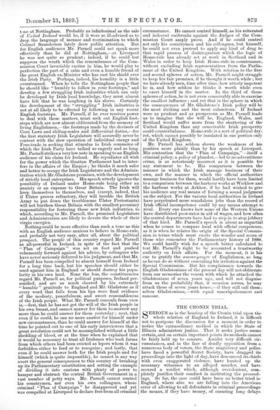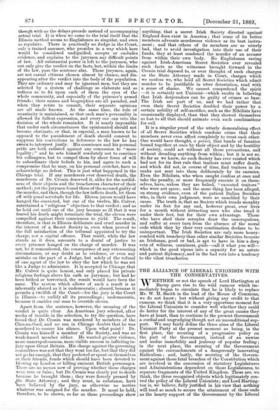THE CRONIN TRIAL.
SERIOUS as is the bearing of the Cronin trial upon the whole relation of England to Ireland, it is difficult not to postpone the discussion for a moment in order to notice the extraordinary method in which the State of Illinois administers justice. That it seeks justice seems certain, and on certain important points its methods cannot be fairly held up to censure. Amidst very difficult cir- cumstances, and in the face of deadly opposition from a numerous body of voters, the State magistracy and police have faced a powerful Secret Society, have dragged its proceedings into the light of day, have denounced its chiefs with even exaggerated violence, have hunted up the necessary witnesses to an alleged murder, and have secured a verdict which, although over-lenient, com- pletely justifies their conduct in instituting the proceed- ings. So far, the case could have been no better tried in England, where also we are falling into the American error of allowing to all defendants in criminal proceedings the means, if they have money, of ensuring long delays though with us the delays precede instead of accompanying actual trial. It is when we come to the trial itself that the Illinois method seems to Englishmen so singular, and even so repulsive. There is practically no Judge in the Court, only a trained assessor, who presides in a way which here would be considered undignified, accepts or excludes evidence, and explains to the jurymen any difficult points of .law. -All substantial power is left to the jurymen, who not only give the verdict on the facts, but, within the limits of the law, pass the sentence also. These jurymen, again, are not casual citizens chosen almost by chance, and dis- appearing after the verdict into the body of the population. They are ordinary and may be ignorant men, but they are selected by a system of challenge so elaborate and so tedious as to fix upon each of them the eyes of the whole community, and especially of the prisoner's armed friends ; their names and biographies are all paraded, and when they retire to consult, their separate opinions are all made known. At the same time, the rule of unanimity is maintained, so that each man's personality is allowed its fullest expression, and every one can veto the decision of the whole remainder. It is nearly impossible that under such circumstances the opinionated should not become obstinate, or that, in especial, a man known to be opposed to the punishment of death should consent to suppress his convictions in deference to the law he has sworn to interpret justly. His conscience and his personal pride are both enlisted against any concession to "mere legality ; " and he sets himself resolutely, not to convince his colleagues, but to compel them by sheer force of will to subordinate their beliefs to his, and agree to -such a compromise that he may, on his personal crotchet, have to acknowledge no defeat. This is just what happened in the Chicago trial. If any murderers ever deserved death, the murderers of Dr. Cronin deserved it, alike for the sordid- ness of their objects and the treacherous character of their method; yet the jurymen found three of the accused guilty of the murder, and then, though the law-inflicts death, let them off with penal servitude for life. Eleven jurors would have hanged the convicted, but one of the twelve, Mr. Culver, entertained a " religious " objection to that verdict; and as he held out until one of the jury became so ill that it was feared his death might terminate the trial, the eleven were compelled against their consciences to yield. The result, therefore, is that in Illinois deliberate and cruel murder in the interest of a Secret Society is, even when proved -to the full satisfaction of the tribunal appointed to try the charge, not a capital offence. That result, while the law stands as it does, amounts to a denial of justice to every prisoner hanged on the charge of murder. It was not, be it remembered, the consequence of any extenuating eireumstance, or any doubt as to evidence, or even any mistake on the part of a Judge, but solely of the refusal of one agent of the law to obey the law which he was set like a Judge to administer. It is accepted in Chicago that Mr. Culver is quite honest, and only placed his private religious feelings above his oath as juryman ; but had he been bribed or terrorised, the result would have been the same. The system which allows of such a result is as inherently absurd as it is undemocratic ; absurd, because it permits a twelfth of the Court—for the jury is the Court in Illinois—to nullify all its proceedings ; undemocratic, because it enables one man to override eleven.
Apart from the sentence, however, the meaning of the verdict is quite clear. An American jury selected, after weeks of trouble in the selection, to try the question, have found that Dr. Cronin was murdered by members of the Clan-na-Gael, and no one in Chicago doubts that he was murdered to ensure his silence. Upon what point ? Dr. Cronin was himself a member of the Society, and was no weak-kneed member either. He wanted greater violence, more unscrupulousness, more visible success in inflicting in- jury upon Great Britain. His charge against the governing committees was not that they went too far, but that they did not-go far enough, that they pocketed or spent on themselves or their friends, funds which should have been devoted to blowing up London or killing eminent British personages. There are no means now of proving whether these charges were true or false ; but Dr. Cronin was clearly put to death because he brought them ; they were fiercely pressed by the State Attorney; and they must, in substance, have been believed by the jury, as otherwise no motive whatever was assigned for the murder. It must be held, therefore, to be shown, so far as these proceedings show anything, that a secret Irish Society directed against England does exist in America ; that some of its better members advocate murderous violence as its best instru- ment ; and that others of its members are so utterly bad, that to avoid investigation into their use of their funds, they at least condoned' the murder of an accuser from within their own body. No Englishman raving against Irish-American Secret Societies ever revealed such facts as the witnesses brought forward in the Cronin trial deposed to, or ever thought of such charges as the State Attorney made in Court, charges which we confess we, who hold all Secret Societies which admit murder to be justifiable in utter detestation, read with a sense of shame. We cannot comprehend the spirit —it is certainly not Unionist—which exults in believing that Irish desperadoes can be guilty of crimes so base. The Irish are part of us, and we had rather that even their Secret Secieties doubled their power by a certain nobility of self-sacrifice, such as the Nihilists have occasionally displayed, than that they showed themselves so lost to all that should animate even such combinations for evil.
It is a singular proof of the utterly demoralising effect of all Secret Societies which condone crime that their members never even affect completely to trust each other. One would have thought, a priori, that bands of fanatics bound together at once by their object and by the hostility of society, could act without all these precautions, and without dreading anything from within ; but it is not so. So-far as we know, no such Society has ever existed which had not for its first rule that traitors must suffer death, and which did not, in course of time, find traitors in its ranks not sent into them deliberately by its enemies. Even the Nihilists, who when caught confess at once and take the penalty, or more frequently execute it on them, selves, have, unless they are belied, "executed traitors" who were not spies ; and the same thing has been alleged, on strong evidence, even of the patient Italian Societies who, in their own judgment, were so ennobled by their cause. The truth is, that no Society which treads morality under its feet for any end, however great, ever lives for a month without attracting men who also tread it under their feet, but for their own advantage. Those who have shed their scruples draw the unscrupulous, and suffer at every turn from the absence of the moral code which they by their very combination declare to -be unimportant. The Irish Societies are only more honey: combed with treachery than other similar Societies because an Irishman, good or bad, is apt to have in him a deep vein of wiliness, canniness, guile—call it what you will— which in the good ripens into a capacity for an astute and patient diplomacy, and in the bad rots into a tendency to the vilest treacheries.











































 Previous page
Previous page